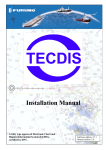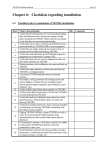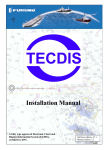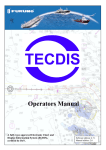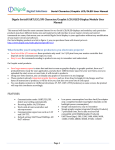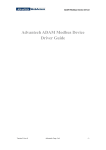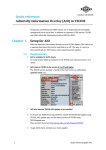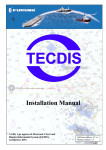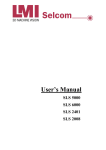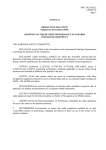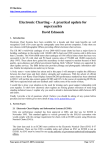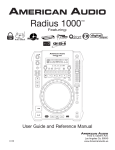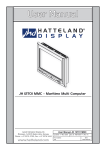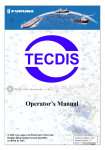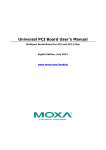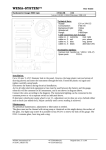Download TECDIS USER MANUAL
Transcript
TECDIS Installation Manual Page 0 Installation Manual A fully type approved Electronic Chart and Display Information System (ECDIS), certified by DnV. Software edition: 4.6.0 Manual edition: 1.8 TECDIS Installation Manual Page 1 The PC Main board is equipped with a litium battery. The lithium battery should be replaced only in the factory. There is a danger of explosion if the wrong type of battery is used for replacement. Observe the following compass safe distances to prevent interference to a magnetic compass: HT405P4 TEL-A1 HT403P4 TEL-A1 HTB04PM TEL-A1 JH20T06MMD-E1/E11 JH19T02MMD-E1/E11 JH23T02FUR-E11 JH20T04MMD-E1/E11 BTC5100C PS/2 DNH HP-6 DHN HPS-6 Furuno RCU-018 Standard Steering compass compass 2.20m 1.50m 2.70m 1.90m 0.75m 0.55m 0.90m 0.70m 0.90m 0.65m 1.25m 1.00m 2.10m 1.35m 0.3m 0.3m 1.5m 1.0m 1.5m 1.0m 0.30m 0.30m TECDIS Installation Manual Page 2 TABLE OF CONTENTS GENERAL INTRODUCTION TO THE INSTALLATION MANUAL ................................. 4 EQUIPMENT LISTS:................................................................................................................... 5 INSTALLATION OVERVIEW................................................................................................... 6 SPECIFICATIONS:...................................................................................................................... 7 CHAPTER 1: MOUNTING ....................................................................................................... 12 1.1 MONITOR UNIT ....................................................................................................................... 12 1.2 PROCESSOR UNIT .................................................................................................................... 19 1.3 CONTROL UNIT FURUNO RCU-018........................................................................................ 22 1.4 KEYBOARD AND TRACKBALL .................................................................................................. 26 1.5 ADDITIONAL UNITS ................................................................................................................. 27 1.6 TRACK CONTROL: ANSCHÜTZ NP 2025 PLUS ..................................................................... 32 CHAPTER 2: WIRING AND SIGNAL DISTRIBUTION ..................................................... 33 2.1 WIRING DIAGRAM (HT405P4 TEL-A1): ............................................................................... 34 2.2 WIRING DIAGRAM (HT403P4 TEL-A1): ............................................................................... 35 2.3 WIRING DIAGRAM (HTB04PM TEL-A1):............................................................................. 36 2.4 SIGNAL DISTRIBUTION DIAGRAM (INTERNAL DATA FLOW): .................................................. 37 2.5 PROCESSOR CONNECTORS, HT405P4 TEL-A1 ..................................................................... 38 2.6 PROCESSOR CONNECTORS, HT403P4 TEL-A1 ..................................................................... 39 2.7 PROCESSOR CONNECTORS, HTB04PM TEL-A1................................................................... 39 2.8 ETHERNET CONNECTORS AND CABLE .................................................................................... 40 2.9 OTHER CONNECTORS .............................................................................................................. 41 CHAPTER 3: PARAMETER SETUP ...................................................................................... 42 3.1. SERVICE MODE (WINDOWS) .................................................................................................. 42 3.2. NMEA DATA SETUP ............................................................................................................... 42 3.2.1 INPUTS ................................................................................................................................... 43 3.2.2 SPEED .................................................................................................................................... 44 3.2.3 OUTPUTS ............................................................................................................................... 44 3.2.4 PORT ACTIVITY ..................................................................................................................... 45 3.2.5 RECEIVED DATA .................................................................................................................... 45 3.2.6 MONITOR AND ALARM CTRL .................................................................................................. 45 3.3 TECDIS NMEA AND TCP/IP SERVER .................................................................................. 46 3.4 SPECIFICATION ....................................................................................................................... 48 1. SAVE AND RESTORE SETUP DEFAULT VALUES ............................................................................. 49 3.5 CHART INSTALLATION / MISC ................................................................................................ 50 3.5.1 INSTALL, UPDATE OR REMOVE CHART DATABASES ................................................................ 50 3.5.2 ENTER VESSEL INFORMATION: ............................................................................................... 51 TECDIS Installation Manual Page 3 3.5.3 SEND REGISTRATION.............................................................................................................. 52 3.5.4 START C-MAP GEODATABASE ADMINISTRATOR .................................................................. 52 3.5.5 INSTALL NEW COLOR CALIBRATION FILE .............................................................................. 52 3.6 LICENSING ............................................................................................................................... 53 3.6.1 TECDIS LICENSE .................................................................................................................. 53 3.6.2 C-MAP LICENSE ................................................................................................................... 54 3.7 TRACK CONTROL .................................................................................................................... 55 3.7.1. STARTING REQUIREMENTS ................................................................................................... 55 3.7.2 DEFAULT VALUES NEW ROUTE .............................................................................................. 56 3.7.3 OTHER SETTINGS ................................................................................................................... 56 CHAPTER 4: OPERATIONAL SYSTEM SETTINGS.......................................................... 57 4.1. SETUP ..................................................................................................................................... 57 4.1.1. NMEA DATA INPUTS:............................................................................................................. 58 4.2. OPERATIONAL PARAMETERS FOR THE SHIP ......................................................................... 59 4.2.1. OWN SHIP OFFCENTER .......................................................................................................... 59 4.2.2. AUTO SENITIVITY ................................................................................................................. 59 4.2.3. SHOW DOUBLE CIRLE ............................................................................................................ 59 4.2.4. COURSE VECTORS ................................................................................................................. 59 4.2.4. AIS RANGE AND TRACK ........................................................................................................ 59 4.2.5. WHEELOVER......................................................................................................................... 59 4.3 CHART LIBRARY ...................................................................................................................... 60 4.4 IMPORT OF S57 DATA .............................................................................................................. 61 CHAPTER 5: MISCELLANEOUS........................................................................................... 63 5.1 ERROR MESSAGES .................................................................................................................. 63 5.2. MONITOR CALIBRATION ....................................................................................................... 65 CHAPTER 6: CHECKLIST REGARDING INSTALLATION............................................. 66 6.1 CHECKLISTS PRIOR TO COMPLETION OF TECDIS INSTALLATION....................................... 66 6.2 CHECKLISTS PRIOR TO COMPLETION OF TRACK CONTROL INSTALLATION. ....................... 68 6.3 INSTALLATION NOTES ............................................................................................................ 75 6.4 TRACK-RECORD OF PERFORMED INSTALLATION................................................................... 75 TECDIS Installation Manual Page 4 General introduction to the installation manual This manual is describing the procedure to ensure a proper and safe installation of our TECDIS onboard a vessel. Please read carefully this manual before you start up the commissioning of the TECDIS. The installation and commissioning of the TECDIS must be performed by an authorized service engineer, which has undertaken training or in other forms gained the required skills to perform an authorized installation of an TECDIS system onboard a vessel. To ensure a professional after-sale service and a personal track-record of TECDIS installations, we recommend that the service engineer saves the defalt setup file to floppy disk or other media. He can then keep this file in his personal register of TECDIS installations. The file is located at: C:\Program files\TECDIS\dta4.setup, or C:\Program files\TECDIS\Telchart.ini (if present). Please note the following: All position inputs to TECDIS from all external sensors must be in WGS-84 datum.. TECDIS shall be supplied by UPS (uninterrupted power supply) 220VAC or emergency power, this shall include also TECDIS backup (if installed) and other hardware related to the TECDIS installation. A dedicated UPS shall be supplied to each TECDIS (if dual installation). The UPS or emergency power shall have sufficient capacity to supply all required equipment for a period of at least 60 seconds. Checklist to verify the proper installation of the TECDIS shall be filled in and filed onboard, installer to preferably file a copy and store in his personal archive. TECDIS Installation Manual Page 5 Equipment lists: Standard Supply Name Type Computer HT405P4 TEL-A1 1 1,9 m power cable Monitor JH20T06 MMD E11 1 2,0 m video cable 1,9 m power cable TECDIS keyboard BTC-5100C 1 1,3 m cable TECDIS mouse Mouse-track 1 1,9 m cable Serial interface RS-422 MOXA OPT8F 1 1,5 m cable Qty Remarks Optional Supply Name Type Computer HTB04PM TEL-A1 (See note 1) 1 1,9 m power cable Computer HT403P4 TEL-A1 (See note 1) 1 1,9m power cable Monitor JH20T06 MMD-E1 1 Monitor JH20T04 MMD E1 / E11 (See note 2) 1 2,0m video cable 1,9m power cable 2,0m video cable 1,9m power cable Monitor JH19T02 MMD E1 / E11 1 2,0m video cable 1,9m power cable Monitor JH23T02 FUR E11 1 2,0m video cable 1,9m power cable Telko Alarm Interface TEA-01 1 1,4 m cable Bracett for monitor JH MMD BR 1 Audio amplifier PCI card HT 00072 OPT-A1 1 Speaker (bracett mount) DNH HP-6 (See note 3) 1 0,5 m cable Speaker (flush mount) DNH HPS-6 (See note 3) 1 0,5 m cable Analog signal collector TA3232-1 1 T Adapter Control Unit Furuno RCU-018 1 Qty Remarks Note 1: HT403P4 TEL-A1 and HTB04PM TEL-A1 can only be used in combination with JH20T04 MMD E1 / E11 or JH19T02 MMD E1 / E11. Note 2: JH20T04 MMD E1 /E11 can only be used in combination with HT403P4 TEL-A1 or HTB04PM TEL-A1 Note 3: Loudspeaker required when display unit does not contain a buzzer TECDIS Installation Manual Installation Overview Page 6 TECDIS Installation Manual Page 7 Specifications: HT403P4 TEL-A1 Processor: HTB04PM TEL-A1 Processor: • 4U - 19" Rack Mount Computer • Intel Pentium 4 - 3.0GHz (S478) • Intelligent Preheating Circuit • Dual Head Video Card MATROX G450-AGP • 512MB RAM (Max 2GB) • 40GB 3,5” Harddrive • DVD/CD-R/W (52x/32x/52x) • 1,44MB 3,5” FDD SLIM • 10/100Mpbs Ethernet LAN • 2 x RS-232 Serial Ports • 8 ports RS-422 serial interface MOXA C218T-PCI with external optoisolated interface OPT-8F • 1 x Parallel port • 6 x USB ports • Standard PS/2 (keyboard & mouse) • Dim: 427(W) x 176(H) x 480(D) mm • 110/230V (300W) • Maritime Stand-alone Computer • Ultra Compact Form Factor • Intel Pentium M 1.1GHz Low Voltage,1MB L2 Cache • 512MB RAM • IDE HDD Automotive Removable 30GB 2,5", 4200 RPM, 2MB Buffer • Dual Head Video Card MATROX G450-PCI • SLIM DVD-Rom • 1.44 MB 3.5" SLIM Floppy Drive • Compact Flash Reader • 10/100Mbps + 10/100/1000Mbps • 1 x RS-232 Serial Port • 5 x RS-422 Serial Ports • 1 x Parallel port • 3 x USB • Standard PS/2 (keyboard & mouse) • Dim: 290(W) x 88(H) x 221(D) mm • 110/230V (100W) HT405P4 TEL-A1 Processor: • 4U – 19” Rack Mount Computer • Intel Pentium 4 – 3.4 GHz (S775) • Dual Head Video Card MATROX P650 PCI-E • 1GB RAM (Max 2GB) • 80GB 2.5” Harddrive • DVD/CD-R/W Dual (48x/16x/6x/8x) • 1,44MB 3,5” FDD • 2x 10/100/1000Mbps Ethernet LAN • 4x RS-232 Serial Ports • 8 ports RS-422 serial interface MOXA C218T-PCI with external optoisolated Interface OPT-8F • 1x Parallel Port • 6x USB 2.0 ports • Standard PS/2 (keyboard & mouse) • Dim: 427 (W) x 176 (H) x 480 (D) mm • 110/230V (400W) TECDIS Installation Manual Page 8 Monitor JH20T04: Monitor JH19T02: • • • • • • • • • • • • • • • • 20,1 inch viewable image size Active matrix, Thin Film Transistor Max resolution: 1600x1200 Pixel size: 0,255 mm H/V Response time: 15 ms Contrast ratio: 600:1 Light intensity: 300 cd/m2 Viewable angle: +- 85 deg. H/V/L/R Active display area: 406x306 mm H/V Auto detects VGA to UXGA Optimum picture with 60 Hz Input signal: DVI-D, DVI-D input 24pin Input signal: RGB, 15pin mini D-SUB Input signal: Compsite Video, RCA Input signal: S-Video AC power: 115 VAC/ 60 Hz 230 VAC/ 50 Hz (100 W max) • Weight: 15 kg • • • • • • • • • • • • • • • • Monitor JH20T06: Monitor JH23T02: • • • • • • • • • • • • • • • • • • • • • • • • • • • • • • • • 20,1 inch viewable image size A-Si Thin Film Transistor Active matrix, Max resolution: 1600x1200 Pixel size: 0,255 mm H/V Response time: 16 ms Contrast ratio: 700:1 Light intensity: 300 cd/m2 Viewable angle: +- 89 deg. H/V/L/R Active display area: 408x306 mm H/V Auto detects VGA to UXGA Optimum picture with 60 Hz Input signal: DVI-D, DVI-D input 24pin Input signal: RGB, 15pin mini D-SUB Input signal: Compsite Video, RCA Input signal: S-Video AC power: 115 VAC/ 60 Hz 230 VAC/ 50 Hz (100 W max) • Weight: 15 kg 19,0 inch viewable image size Active matrix, Thin Film Transistor Max resolution: 1280 x 1024 Pixel size: 0,294 mm H/V Response time: 15 ms Contrast ratio: 700:1 Light intensity: 300 cd/m2 Viewable angle: +- 85 deg. H/V/L/R Display area: 376.32x301.056 mm H/V Auto detects VGA to UXGA Optimum picture with 60 Hz Input signal: DVI-D, DVI-D input 24pin Input signal: RGB, 15pin mini D-SUB Input signal: Compsite Video, RCA Input signal: S-Video AC power: 115 VAC/ 60 Hz 230 VAC/ 50 Hz (100 W max) • Weight: 12 kg 23,1 inch viewable image size Thin Film Transistor Active matrix, Max resolution: 1600x1200 Pixel size: 0,294 mm H/V Response time: 20 ms Contrast ratio: 600:1 Light intensity: 250 cd/m2 Viewable angle: +- 85 deg. H/V/L/R Active display area: 440.4x352.8 mm H/V Auto detects VGA to UXGA Optimum picture with 60 Hz Input signal: DVI-D, DVI-D input 24pin Input signal: RGB, 15pin mini D-SUB Input signal: Compsite Video, RCA Input signal: S-Video AC power: 115 VAC/ 60 Hz 230 VAC/ 50 Hz (100 W max) • Weight: 17 kg TECDIS Installation Manual MOUSE-TRAK PS/2: Functional Specifications: Resolution: 192 to 576 pulses per revolution of the ball. Input Switches: Three (3) Interface: IBM PS/2 Connector: 6-Pin Mini-DIN Male Pin Assignments: Pin 1 = PS/2 Data Pin 2 = NC Pin 3 = Common Pin 4 = +5V Pin 5 = PS/2 clock Pin 6 = NC Compatibility: Microsoft PS/2 Mouse Protocol, Logitech PS/2 Mouse Protocol Switches: Mechanically limited, break resistant Cable: 96”+-0.5” Power Consumption: Idle: 8mA Max: 12mA Mechanical Specifications: Dimensions: Approximately 4”wide x 8”long Weight: 1.3 lbs. Body Material: Glass filled Xenoy thermoplastic, black Ball Material: Cast Phenolic Resin Ball Hardness: Rockwell H 85 Tracking Force: 1.5 oz. maximum, 0.5 oz. typical (15g) Ball Load: 250 lbs. maximum downward Ball Speed: 500 RPM maximum Hand Pad: Injection-molded vinyl, black Environmental Specifications: Operating 0 to +50 degrees Celsius Temperature: Storage Temperature: -20 to +60 degrees Celsius Humidity: 0 to 95% non condensing Page 9 TECDIS Installation Manual Page 10 Speaker HP-6/HPS-6: Material/Colour Mounting Termination Weight IP-rating (UL Equivalent) Max. / min. amb. Temp Rated / max. power SPL 1W/1m SPL rated power Effective freq. range Dispersion (-6dB) 1kHz / 4kHz Directivity factor, Q Polyamide UL94 V0 / RAL 7035 Bracket Cable,0,5m 0.5 kg (-) 67 90°C / -40 °C 6W / 15W 101 db 108 db 500 – 7500 Hz 170° / 70° 4,3 Telchart Alarm interface, TEA-01: Outputs: (connector 1,2,3,4) are a solid state relay LCA110E which has capabilities of max 50VDC, max 200mA. Input: (connector 5,6) uses a current limited (6.8 Kohm resistor) opto coupler MCT5211. Reset in at 10-30 VDC. All input and outputs are electrically isolated. Shield shall be connected at alarm central side. Shield are connected in Dsubmin 9f. connector, but are not cross connected in the interface box. A 1.5 m Cable with Dsubmin 9p female (PC-serial port) in one end and an interface box with 7 screw terminal in the other end. Wiring info: (1)> Alarm Out - (NO) (2)> Alarm Out + (NO) (3)> Sound Alarm out reset - (NO) (4)> Sound Alarm out reset + (NO) (5)< Sound Alarm inp. Reset – (NO) (6)< Sound Alarm inp. Reset + (NO) (7)- Cable shield TECDIS Installation Manual Page 11 TELChart TA3232-1 analog adapter. Technical specifications: Inputs: 32 digital inputs 32 analog input (24 x +/- 10VDC and 8 x 4-20mA ) Outputs: RS422 output ar baudrate 4800,n,8,1 to Furuno VDR Ethernet TCP/IP serverport at 192.168.0.60 : 2000 Ethernet UDP/IP broadcast at 0.0.0.0 : 2100 The placement of the modules in the box are. [ADAM4051 #2] [ADAM4017+ #4] [ADAM4017+ #6] [ADAM6520] [ADAM6500] [ADAM4051 #1] [ADAM4017+ #3] [ADAM4017+ #5] From left to right as indicated in the picture ADADM 6520 5 port industrial 10/100 Mb thernet switch w/auto direction sense. ADADM 6500 WinCE processor 2 x ADADM 4051 á 8 x digital inputs 2 x ADADM 4017+ á 8 x analog inputs 2 x ADADM 4017+ á 8 x analog inputs (top one is 8 x 4-20mA inputs) Powered from 12-30 VDC Typical consumption 0.4A @24 VDC Fuses: 2 x 1,6AT TECDIS Installation Manual Page 12 Chapter 1: Mounting 1.1 Monitor Unit The monitor unit can be flush mounted in a console panel, or mounted on a desktop using optional accessories. When selecting a mounting location, keep in mind the following points: 1. Select a location where the display unit can be viewed conveniently and where the screen can be viewed while facing towards the bow. 2. Select a location where vibrations are down to a minimum, try to avoid vibrations by adding strength to console where monitor is about to be installed. 3. Locate the unit out of direct sunlight and away from heat sources because of heat that can build up inside the cabinet. 4. Locate the equipment away from places subject to water splash and rain. 5. Leave sufficient space on the sides and rear of the unit to facilitate maintenance. 6. A magnetic compass will be affected if the monitor unit is placed too close to the magnetic compass. Observe the compass safe distances to prevent deviation of a magnetic compass. 7. An optional monitor bracket can be supplied for tabletop installations. Screws for mounting the monitor to the console are supplied. When bracket is used screws for attaching bracket and monitor together is supplied. Screws for mounting bracket to table is not supplied. TECDIS Installation Manual Page 13 Outline dimensions for JH20T04 and JH20T06: Cutout dimensions for JH20T04 and JH20T06: All figures in mm. TECDIS Installation Manual Mounting of JH20T04 and JH20T06 with bracket: All figures in mm. Page 14 TECDIS Installation Manual Page 15 Outline dimensions for JH19T02: Cutout dimensions for JH19T02: All figures in mm TECDIS Installation Manual Mounting of JH19T02 with bracket: All figures in mm. Page 16 TECDIS Installation Manual Outline dimensions for JH 23T02: Cutout dimensions for JH23T02: Page 17 TECDIS Installation Manual Mounting of JH23T02 with bracket: Page 18 TECDIS Installation Manual Page 19 1.2 Processor Unit The processor unit can be mounted inside on bridge console or other suitable space on the bridge. When selecting a mounting location, keep in mind the following points: 1. Select a location where vibrations are down to a minimum, try to avoid vibrations by adding strength to console where the processor is about to be installed. 2. Locate the unit away from heat sources because of heat that can build up inside the cabinet. 3. Locate the equipment away from places subject to water splash and rain. 4. Leave sufficient space on the sides and rear of the unit to facilitate maintenance and interconnection cabling. 5. Navigator shall update charts in the processor weekly. Mount the processor at a location that enables the navigator easy access to front doors of the processor. It must be possible to open CD drawer of processor without obstructions. 6. The power switch shall be easily to access, front of processor may be flush mounted in the console to enable access or other means to be provided for easy access. 7. Service key dongle must be possible to remove and insert to enable service technician to enter service mode. 8. MOXA 8-port RS-422 connection box to be arranged close to processor to enable easy interconnection. MOXA is supplied with 1,5 m interface cable between processor and connection box. Do not protrude the housing with screws to fasten the processor. Straps should be used to fasten the processor at its location, without protruding the housing. Straps are not supplied and must be arranged locally. Check that front doors of processor can easily be opened and that cables can easily arranged in the back of the processor. The processor is suitable for rack-mounting, 19” width rack. Height is 4U. TECDIS Installation Manual Outline dimensions for HT403P4 and HT405P4: Page 20 All figures in mm. TECDIS Installation Manual Page 21 Outline dimensions for HTB04PM TEL-A1: All figures in mm. All figures in mm. TECDIS Installation Manual Page 22 1.3 Control Unit Furuno RCU-018 The control unit may be mounted on a desktop, with or without the KB fixing metal (supplied), which mounts the control unit at an angle. Mounting considerations When selecting a mounting location, keep in mind the following points: • Select a location where the control unit can be operated conveniently. • Locate the unit away from heat sources because of heat that can build up inside the cabinet. • Locate the equipment away from places subject to water splash and rain. • Determine the mounting location considering the length of the signal cable between the control unit and the processor unit. • A magnetic compass will be affected if the control unit is placed too close to the magnetic compass. Observe the compass safe distances specified at the start of this manual to prevent deviation of a magnetic compass. Fixing with KB fixing plate 1. Fix the KB fixing plate to the bottom of the control unit. 2. Attach three cushions to the bottom of the control unit. 3. Fix it to a desired location with self-tapping screws (local supply). Fixing without KB fixing metal 1. Drill four mounting holes of 5 mm diameter referring to the outline drawing. 2. Fix the control unit with four screws (M4) from under side of the desktop. (The M4 screws with a sufficient length for the thickness of the desktop should be provided locally.) Flush mounting Use the optional flush mount kit Furuno FP03-09870 to mount the control unit to a console panel. Name: Flush mount kit Type: Furuno FP03-09870 Code No.: 008-535-630 No. Name Type 1 Mount plate 03-163-7531 2 Hex bolt M4 3 Wing screw M4X30 Qty 4 4 4 1. Prepare a cutout in the mounting location as shown in the outline figures. 2. Set the control unit to the cutout. 3. Attach the mounting plate to the control unit with four screws from the rear side. 4. Screw the wing screw to each mounting plate and then insert hex bolt to each wing screw. 5. Fasten each wing screw and then fasten the hex nuts as shown in the outline figures. TECDIS Installation Manual Page 23 Furuno RCU-018 Control Unit outline (Desktop mount) All figures in mm. TECDIS Installation Manual Page 24 Furuno RCU-018 Control Unit outline (Desktop mount with bracket) All figures in mm TECDIS Installation Manual Furuno RCU-018 Control Unit outline (Flush mount) Page 25 TECDIS Installation Manual Page 26 1.4 Keyboard and trackball Keyboard and trackball must be monted close together, such that both can be operated simultaneously by one person. When selecting a mounting location, keep in mind the following points: 1. Select a location where the control unit can be operated conveniently. 2. Locate the unit away from heat sources because of heat that can build up inside the cabinet. 3. Locate the equipment away from places subject to water splash and rain. 4. Determine the mounting location considering the length of the signal cable between the keyboard unit and the processor unit. (The length of the signal cable is 1,3 m). 5. Determine the mounting location considering the length of the signal cable between the trackball unit and the processor unit. (The length of the signal cable is 1,9 m). Outline dimensions for BTC-5100C PS/2: All dimensions in mm. TECDIS Installation Manual Page 27 Outline dimensions for Trackball: 202 mm 101 mm 1.5 Additional units When mounting additional units such as, loudspeaker, analogue alarm units, MOXA interface and other peripheral equipment, general considerations should be taken to ensure proper functions of respective equipment. When selecting a mounting location, keep in mind the following points: 1. Select a location where vibrations are down to a minimum, try to avoid vibrations by adding strength to console where the processor is about to be installed. 2. Locate the unit away from heat sources because of heat that can build up inside the cabinet. 3. Locate the equipment away from places subject to water splash and rain. 4. Leave sufficient space on the sides and rear of the unit to facilitate maintenance and interconnection cabling. 5. Mount the loudspeaker such that audible sound level is not seriously degraded. Do not protrude the housing with screws to fasten the units. Straps should be used to fasten the units at its location, without protruding the housing. Straps are not supplied and must be arranged locally. TECDIS Installation Manual Page 28 Outline dimensions for alarm interface TEA-01: Length: 125 mm Width: 55 mm Heigth: 40 mm Cable length: 1400 mm Outline dimensions for loudspeaker DNH HP6, with bracett: Loudspeaker cable length is 500 mm. TECDIS Installation Manual Outline dimensions for loudspeaker DNH HPS6, for flush mount: Loudspeaker cable length is 500 mm. Page 29 TECDIS Installation Manual Page 30 Outline dimensions for analog interface connection/distribution box, TA3232-1: Length: 500 mm Width: 500 mm Heigth: 210 mm TECDIS Installation Manual Outline dimensions for MOXA RS-422 interface box, MOXA OPT8F: Dimensions for box: 247 x 108 x 35 mm DB-62 cable length: 1500 mm Page 31 TECDIS Installation Manual Page 32 1.6 Track Control: Anschütz NP 2025 PLUS Refer to Anschütz NP 2025 PLUS installation manual for installation of the autopilot. All applicable procedures and guidelines are to be followed. For valid installation and operation of Track Control functionality, TECDIS must be as a minimum be connected to the following: • • • • Two Independent position sensors Two Independent heading sensors Speed sensor Alarm System for transfer of back-up navigator alarm TECDIS and the NP 2025 PLUS must be supplied with the same set of heading and log sensor inputs. On vessels where the steering system does not provide a “freeze rudder function” and maintained voltage is required for maintaining rudder angle, provisions must be made on installation of Anschütz NP 2025 PLUS to maintain steering voltage output on power loss to the NP 2025 PLUS. Location of change over controls The steering mode selector switch or override facility, if installed, shall be located at or in the immediate vicinity of the main conning position. Connection to TECDIS The serial transfer module (NB05-343) on the Anschütz NP 2025 PLUS must be connected to a TECDIS serial port and configured in TECDIS SETUP (See chapter 3.6). TECDIS Installation Manual Page 33 Chapter 2: Wiring and signal distribution On the following pages wiring and signal distribution diagrams are shown. Signal distribution diagram is an indication of possible means of signal distribution. During installation actual need for signal distribution must be verified by installer, depending on signals available and actual hardware installation on the specific vessel. RS422 Box with 8xDB25 Female & Optical Isolation RS-422 — DB25 Female — for Opt8F Pin No. Signal 2 RxD+(B) 3 TxD+(B) 7 GND 14 RxD-(A) 16 TxD-(A) OPT8F needs external power supply. Use a 220 VAC power adaptor to supply 5 VDC to OPT8F. Internal wiring of TEA01. TECDIS Installation Manual 2.1 Wiring diagram (HT405P4 TEL-A1): Page 34 TECDIS Installation Manual 2.2 Wiring diagram (HT403P4 TEL-A1): Page 35 TECDIS Installation Manual 2.3 Wiring diagram (HTB04PM TEL-A1): Page 36 TECDIS Installation Manual 2.4 Signal distribution diagram (internal data flow): Page 37 TECDIS Installation Manual Page 38 2.5 Processor connectors, HT405P4 TEL-A1 • NB! Only connect Furuno RCU-018 to RCU-018 connector. Proprietary connector supplies live 12V DC current and may damage any other equipment connected! • To fully comply with type approvals: -Ferrites (Würth 74271221) must be mounted on COM / LPT cables. -Ferrites (Würth 7427111) must be mounted on LAN cables. • COM1, COM3 and COM4 are to be used for ECDIS monitor control, TEA-01 Alarm central interface. Other sensors may be connected to COM1, COM3 and COM4 via an RS232/RS422 interface (such as AD400). • We advise that only COM1, COM3 and COM4 are used to connect AIS, via an RS232/RS422 interface. • If optional speaker connectors HT00072 Opt-A1 are used, LINE OUT and LINE IN are to be connected using the supplied cable. • Lan connector GBLAN1 is to be used when connecting the TECDIS unit to other TECDIS units, T Adapter or Furuno FAR-2xx7 series radar. • Lan connector GBLAN2 can optionally be used for connecting the TECDIS unit to other networks or internet. TECDIS Installation Manual Page 39 2.6 Processor connectors, HT403P4 TEL-A1 COM 1 and COM 2 are only to be used for ECDIS monitor control, TEA-01 Alarm central interface or AIS via an RS232/RS422 interface (such as AD400). 2.7 Processor connectors, HTB04PM TEL-A1 COM 1 is only to be used for ECDIS monitor control. TECDIS Installation Manual 2.8 Ethernet connectors and cable Page 40 TECDIS Installation Manual 2.9 Other connectors Page 41 TECDIS Installation Manual Page 42 Chapter 3: Parameter Setup When you first starts the TECDIS computer it will automatically start up and enter the TECDIS program. Windows XP and TECDIS software are pre-installed. To exit TECDIS program for commissioning and installation setup procedures see chapter 2.1 for details. 3.1. Service mode (Windows) When you exit TECDIS (using the button at the upper left corner), the chart plotter will automatically be turned off after you confirm that you want to exit. In order to exit TECDIS without turning the chart plotter off, you must insert the USB service key (memory dongle) before you exit TECDIS. When this service key is connected to the chart plotter, the chart plotter will not be turned off when you exit TECDIS and you will be able to work in Windows (service mode) and open the Setup program by double clicking on the Setup icon on the desktop. When service mode is available, a text indication is shown in the lower right corner of the chart. 3.2. NMEA data setup Use this tab of the setup program to configure input and output signals. This is done by selecting the type of NMEA messages for each sensor type and the COM port where the signal is connected. TECDIS Installation Manual Page 43 There are four main areas of this tab: “Inputs”, “Outputs”, “Port Activity” and “Received data on port X”. 3.2.1 Inputs Note: All position inputs to TECDIS from all external sensors must be in WGS84 format. In the first area (“Inputs”), you can configure the message type and source of the different possible sensor inputs. In the first column, “Select sensor” you can select which sensor you want to configure. The sensor name will turn green when valid NMEA sentences of the type specified is received on the specified port. In the box next to “Sentence” you can select the type of NMEA sentence this input should be read from on a drop down menu. For more information about the different NMEA sentences, see the table below. In the third box, (“Port”) you can select the COM port the selected sensor data type should be read from by using the two arrow buttons at the bottom of the column (to the right of the drop down menu for speed/port). The COM port field will turn red if the specified COM port is already in use by monitor, alarm control or RCU-018. This means that the port selection is invalid, and that another COM port must be selected either for the sensor or the conflicting equipment. In the fourth column, “Sensor Description”, you can manually enter a text description that identifies the source instrument of the sensor data. NB: When there is a port collision (when there is an attempt to use the same port for multiple conflicting functions), the affected ports are marked with red colour. IP ports: TECDIS has 10 COM ports and 4 IP ports. For each IP port, the IP address and port number must be entered. The “Test” button establishes a connection to the IP server with the selected address/port number and the “Received data” area will show any data that is received. Example: In order to receive position data from a GPS, you need to: 1. Select “Position 1” or “Position 2” from the “Select sensor” column. 2. Select the COM port the GPS is connected to in the “Port” field. 3. Select the NMEA sentence type to be used. 4. Optionally (but recommended) enter a description identifying the sensor as a GPS in the “Sensor Description” field. If the sensor signal is lost while the TECDIS is in operation, an alarm will be sounded. The alarm message will indicate the type of sensor lost as well as what port it is connected to and the sensor description you enter in this field. This way, you can quickly identify the failing instrument (instead of having to refer to the configuration in the Setup program). NMEA Sensor inputs and their status can also be displayed in TECDIS. (See chapter 3.1.3.1). TECDIS Installation Manual Page 44 3.2.2 Speed In this field you select the data speed to be used for the COM port of the currently selected sensor. The NMEA standard is 4800 (low speed). Be aware though that some instruments require a different data speed selection. There is also a NMEA high speed standard (38400). AIS units typically use high speed in order to transmit as much data as possible. (Select AIS in the “Selected sensor” column and check that the “Speed” field indicates the high-speed setting). The speed is changed by selecting the speed from the drop down menu. NMEA sentence APB DBT DPT GGA GLL GNS HDT MWV OSD RMB RMC RSD RTE TTM VDO VBW VHW VTG VWR WPL Description Heading/Track Controller (Autopilot) Sentence ”B” Depth Below Transducer Depth Global Positioning System Fix Data Geographic Position – Latitude / Longitude GNSS Fix Data Heading, True Wind Speed and Angle Own Ship Data Recommended Minimum Navigation Information Recommended Minimum Specific GNSS Data Radar System Data Routes RTE Tracked Target Message UAIS VHF Data-link Own-vessel report Dual Ground/Water Speed Water Speed and Heading Course Over Ground and Ground Speed Relative (Apparent) Wind Speed and Angle Waypoint Location 3.2.3 Outputs In this area you can select which NMEA sentences you want TECDIS to output. In order to send a NMEA sentence type on a COM port, put a check mark in the box at the intersection of the desired sentence type row and COM port column. You can find descriptions of the different NMEA sentence types in the table above. Regarding the RTE route sentence; note that TECDIS will send up to 10 of the next waypoints of the currently active route. By selecting ”Activate conning IP server port 2001” you activate a TCP/IP server in TECDIS for data transfer to the TECDIS Conning program. This option should only be selected when a connected TECDIS Conning unit should use data from TECDIS. TECDIS Installation Manual Page 45 3.2.4 Port Activity In this area you can see which ports that are receiving data. Whenever data is received on a COM port, the corresponding indicator in this area will flash green. The indicators are for COM ports 1-12 in increasing order from left to right. 3.2.5 Received data In this area you can see the data that are being received from the COM port that is marked with green in the “Input” area. By clicking on one of the other COM ports in the “Input” area, the data shown in the “Received Data” area will change correspondingly. 3.2.6 Monitor and alarm ctrl The units available in this area all require dedicated COM ports (if used). If not used, these settings should be set to ‘0’. If the specified COM port is in use by a sensor, the selection field will turn red to indicate the conflict situation. This means that the port selection is invalid, and that another COM port must be selected either for the sensor or the conflicting equipment. Monitor Ctrl: Select the COM port that the monitor is connected to in this field. This connection will control the monitor background light and calibration settings, as well as the alarm sounder in the screen unit. (if used) Alarm ctrl: Select the COM port that should be used for the alarm central interface. (if used) RCU-018 ctrl: Select the COM port that the Furuno RCU-018 keyboard and trackball control unit is connected to. (if used) TECDIS Installation Manual Page 46 3.3 TECDIS NMEA and TCP/IP server Runs and outputs selected comport data out through a TCP/IP network. This way one sensor can be shared by multiple users in a TCP/IP network. As shown above, “HDT sentence”, is received on comport 3 and is retransmitted on port 2003 through TCP/IP address 192.168.0.113. This means that backup ECDIS (or other connected computers to the LAN network) can receive “HDT” data through TCP/IP by selecting correct IP address (192.168.0.113 port 2003). Setup procedure: 1. Select appropriate comport with desired data 2. Select appropriate baud rate on receiving comport, by using “Speed” dialog box 3. Select to which TCP/IP ”port” it shall retransmit data (from the selected comport), for exsample 2003 4. Describe with text connected device to TCP/IP port ( backup station, conning PC etc.) 5. Select which NMEA sentences you which to send (you may select one, multiple or all on one TDP/IP port) TECDIS Installation Manual Page 47 ”Data activity” shows activity on selected (monitored) comport. HDT is marked in blue due to it is selected for output to TCP/IP. ”Clients” shows how many listeners (connections) there are on each connected TCP/IP port. Logical description and ranking of NMEA sentences. TELchart ECDIS can use the following sentences from a GPS transmitter, number one have the highest ranking/priority: Position 1. $??GNS 2. $??GGA 3. $??GLL 4. $??RMC 5. !AIVDO * GNSS fix data GPS fix data Geographic position lat/long Recommended minimum specific GNSS data AIS own ship position. UAIS VHF Data link own-vessel report Course & Speed 1. $??VTG Course and speed over ground 2. $??RMC Recommended minimum specific GNSS data 3. $??OSD Own ship data 4. !AIVDO AIS own ship position. UAIS VHF Data link own-vessel report Heading 1. $??HDT 2. $??OSD 3. $??VHW 4. !AIVDO Heading true Own ship data Water Speed and Heading AIS own ship position. UAIS VHF Data link own-vessel report Radar ARPA $??TTM Tracked Target Message Radar Cursor $??RSD Radar System Data AIS !AI??? AIS UAIS VHF Data Link Depth 1. $??DPT 2. $??DBT Depth Depth below transducer * Position: !AIVDO may be used as a secondary position source whenever primary source is missing. TECDIS Installation Manual Page 48 3.4 Specification On this tab, the dimensions of the vessel and the placement of sensors on the vessel is specified. Specifying the position of the sensors is important in order to get the highest possible accuracy in position (GPS antenna) and other data as possible. • In the “Ship Size” area, enter the length, beam, draught and height of the vessel in meters. For length and beam, the largest extent of vessel length and beam should be used. • For draught and height you enter the largest possible height and draught taking load conditions into consideration. • When a second TECDIS unit is present in the installation (for example, bacup unit). The IP address of the second TECDIS unit should be entered in the ”Data export IP” field. This will activate automatic transfer of active routes to the second TECDIS, and it will be possible to transfer data (objects, tracks, routes) to the second unit. • Backward (gyro-180º): checking this box turns the heading value from gyro 180 degrees. TECDIS Installation Manual Page 49 • In the “Alarm” area, you can select whether sound alarms should sound through the PC speaker in the chart plotter, or through the monitor buzzer. • If two positioning methods are in use, the button “Erase Secondary past track” allows you to remove the past track line from the secondary position sensor. • Arpa is conning referenced: when this checkbox is marked, it is assumed that target information from Arpa radar is already adjusted to the navigator position. If it is not marked, TECDIS will do the necessary adjustments. • Raise alarm if HDT1-HDT2 > 2.5º: when this box is checked, an alarm will be given if the heading from the two sensors ”Heading 1” and ”Heading 2” deviates with more than 2.5 degrees. • Shiphandle mode (selectable CPA alarm): when this option is activated, it will be possible to suppress CPA alarms (see chapter 3.7.3). 1. Save and restore setup default values By clicking the button “Save setup default values”, all settings in the “Nmea data” and “Size and sensors” tabs are saved as default settings. If temporary changes to the settings are made later, the default values can be restored by clicking the button “Restore saved default values”. For future use and to be certain that no misunderstandings may occur regarding the installation we recommend that the service engineer saves the default setup file to floppy disk or other media. He can then keep this file in his personal register of TECDIS installations. The file is located at: C:\Program files\TECDIS\dta4.setup TECDIS Installation Manual Page 50 3.5 Chart Installation / Misc 3.5.1 Install, update or remove chart databases By clicking “Copy”, a new area with an overview of installed chart databases is opened. Insert the CD for the chart database that is to be operated on and select the CD-ROM drive from the drop down menu below the database list. The Setup program will read the CD and display the available actions for the chart database. (Install, Update, Remove and ‘Set as Default’). Important: ‘Purchase’ chart licenses are locked to a specific edition of the chart database. If a different edition of the database is installed, new licenses must be acquired. ‘Subscription’ licenses remain valid when newer chart database editions are installed. TECDIS Installation Manual Page 51 If a CD is not available for the chart database (As would be the case for databases containing imported S57 data), these databases can be selected for modification by choosing a drive other than the CD-ROM drive from the drive drop down menu. (For example D:\). When Setup is unable to find a chart database on the selected drive, you get the option to manually select an installed database by pressing the button “Select an Installed DB”. You will get two options for the database you select from the list of installed databases: “Remove” and “Set as Default”. We recommend that the “World” database should be set as default, if installed. Important: Some chart databases are protected and cannot be removed unless you have a CD for the database available. The option ‘Remove Licenses’ will also be displayed in some instances. Selecting this option and pressing ‘Start’ will allow you to remove all chart licenses for the specified database. Make sure you have new valid chart licenses available before starting this option! 3.5.2 Enter vessel information: In this area, information about the vessel and owner should be entered. This information is needed for chart licensing and warranty purposes. TECDIS Installation Manual Page 52 3.5.3 Send registration When the vessel information has been entered and stored, the option to send registration will be enabled on the main area of this part of the Setup program. If “Send on Diskette” is selected, the registration file will be saved to an inserted diskette. If “Send Manually” is selected, the registration file will be saved on the hard drive and a message informing you about the file name and location of the file. Send this file to the specified email address whenever the “Vessel information” data is changed. 3.5.4 Start C-Map GeoDatabase Administrator By selecting a chart database and clicking “Check Signature”, it is possible to verify that the database has not been corrupted and is in the same state as when provided by C-Map. 3.5.5 Install new Color Calibration file The “Install new Color Calibration file” button is used to load a new color calibration data file (Extension .czp) that will ensure that the colors used in the chart display are as accurate as possible. Such a file is either received with the monitor or obtained from Furuno Norway, Telko AS or the producer of the monitor. TECDIS Installation Manual Page 53 3.6 Licensing 3.6.1 TECDIS license By clicking “Show / edit license” information about the current system license is shown as illustrated below. This information includes the license number and version information, and a list of installed optional components in blue in the right part of the area. In order to activate additional optional components, a password for this should be entered in the “Password” field and the “Program” button should be clicked. TECDIS Installation Manual Page 54 3.6.2 C-MAP License Add licenses manually: Select the zone or area you have received a license for in the window to the right (under “Data set or Area name”). The 16-character license code is entered in the “License string” field. Finally, click on “Add License” to activate the license. Add license from file: Use this option if you want to use a supplied password.usr file to activate chart licenses, browse to the location of this file and select it and press “OK”. The licenses contained in the file will be automatically activated. In this area, it is also possible to get a list of licenses that are expired and no longer valid (“Get expired licenses”), to see a list of all valid licenses (“Licenses list”) and to generate an order file for new licenses (“License order”). TECDIS Installation Manual Page 55 3.7 Track Control On this tab, settings for connection to Raytheon Anschütz AP2025 PLUS autopilot and Track Control can be set. Refer to Raytheon Anschütz AP2025 PLUS Installation Manual for installation and configuration of the autopilot. NB: The autopilot and TECDIS must be supplied with the same heading and log sensor inputs! 3.7.1. Starting Requirements The values in this area specify the conditions needed before Track Control mode can be activated. Max course deviation The maximum number of degrees the course over ground (COG) of the vessel can differ from the planned course. Max lane deviation The maximum distance of the vessel position from the planned route leg, expressed as a multiplier of the planned route leg lane width. (For example, if the lane setting for the initial planned route leg is 100m, and ‘max lane deviation’ is set to x2, the vessel position can be up to 200m from the planned route leg when Track Control is activated.) Min. speed The minimum speed of the vessel in knots. TECDIS Installation Manual Page 56 3.7.2 Default values new route The values in this area will be used as the default values for the parameters specified when planning a new route. Speed kn The default planned speed in knots for new route legs. Lane x 0.01 NM The default planned lane width for new route legs, expressed as hundredths of a nautical mile. (For example, if the value specified here is 10, the default lane width would be 0.1 NM.) Turn radius x 0.1 NM The default planned turn radius for new route legs, expressed as tenths of a nautical mile. (For example, if the value specified here is 5, the default turn radius would be 0.5 NM.) 3.7.3 Other settings Anschütz AP 20205 PLUS at COM Specify the COM port that the Raytheon Anschütz AP 2025 PLUS autopilot is connected to. Min. allowed turn radius x 0.01 NM This setting specifies the minimum turn radius allowed, expressed as hundredths of a nautical mile. This value should be determined during vessel sea trials. Max. allowed WOL distance x 0.01 NM This setting specifies the maximum value allowed for operator selected Wheelover Line (WOL) distance, expressed as hundredths of a nautical mile. Max Remote Control ROT This setting specifies the maximum rate of turn (ROT) value allowed in the autopilot remote control panel in TECDIS, expressed as degrees per minute. WP warning and alarm time This setting controls how long before a waypoint warnings and alarms are generated. Alarm limit difference primary and secondary heading This setting controls the number of degrees the primary and secondary heading sensor values can differ before an alarm is generated. If the two heading sensors differ by more than this value, an alarm is generated in TECDIS. Alarm limit difference primary and secondary position x 0.01 NM This setting controls the distance allowed between the two position sensors before an alarm is generated, expressed in hundredths of a nautical mile. If the distance between the positions reported by the two position sensors is larger than this value, an alarm is generated in TECDIS. TECDIS Installation Manual Page 57 Chapter 4: Operational system settings When pressing menu folder in the top menu bar, menu folders vil open in the lower part of the side menu field. There are 6 different menu folders: data, logg, safety, setup, chart and ship. Folders are separated in a archive system and one of the folders is displayed at time. Select desired folder by pressing a tag in the archive hieraky. 4.1. Setup This folders contains. 1. Ship draught 2. Language selection 3. Time zone selection 4. Nmea input status 5. Nav. Position offset 6. Chart utilities 7. Chart library (installed charts) 8. Auxilary 9. Alarm volume (only shown when alarm bell is set to pc speaker in the setup programme) 10. Hide/unhide tool tip.(see chapter 2.1) Ship draught: minimum and maximum ship draught is defined in the setup program. When TECDIS starts, the maximum draught is used as default, but this can changed in the setup menu folder. TECDIS Installation Manual Page 58 4.1.1. Nmea data inputs: Displaying a list describing which ports the various sensor information is recived from. Also displaying which Nmea sentences used and the data communication status. This is only a information window. Changes have to be made in the separate setup program. (see chapter 7). Position fixing: Displays 2 sources for positioning. Primary and secondary can be selected. Primary and secondary can be displayed simultaniously on the chart display. If primary position fixing system falls out, the system automatically uses secondary. If both positioning systems drops out, change over to dead reckoning is executed. (Log+Gyro) TECDIS Installation Manual Page 59 4.2. Operational parameters for the Ship 4.2.1. Own ship offcenter Location of own ship on the screen. High value: Vessel is placed more offcenter. Low value: vessel is placed closer to screen centre. This function is only active when auto function is enabled. 4.2.2. Auto senitivity How often chart to be centered/shifted in Auto mode. 4.2.3. Show double cirle The boat symbol can be displayed with or without circles. 4.2.4. Course vectors Sets vector length on own ship and targets. (One cross line on vector is one minute). 4.2.4. AIS range and track AIS area/coverage and track settings. All targets can be set to active.Detailed info about AIS in chapter 6.5. 4.2.5. Wheelover Wheel over line distance from Waypoint. New command to track pilot and route monitoring. Please verify with the vessel’s Master these values before finalizing the installation. These parameters are not part of the setup program, but are included in the normal program. TECDIS Installation Manual Page 60 4.3 Chart library Chart library displays av overview of all chart in a database. Selecting a database from the drop down menu a list with all charts in the database appears, sorted by publisher. Highlight a chart in the list to display further information (middle field). When double clicking on a chart in the list, it will appear if licens is present. When vessel is sailing, vessel is automatically centered. (if not auto function is disabled). NB: Chart library only displays databases selected in setup menu folder. Chart boundaries: graphically presents coverage of all charts in the database at present level. (Levels comply with scale selected on the top menu bar) Licensed charts are displayed with magenta, non licensed charts are marked with black boundary. Chart names are presented in the bottom left hand corner of the square. TECDIS Installation Manual Page 61 Remove dataset: If a database contains imported S57 data is selected in the drop down menu, the button” Remove Dataset” will delete selected chart. 4.4 Import of S57 data NB: When two ECDIS machines are connected, make sure to make the same updates in the second ECDIS. Import of S57 data is done trough the chart library. Select database in the drop down menu and press “Import S57”. A database contains of datasets (charts). ENC data is sold as ENC cells in S57 format. Trough import to a database every ENC cell is converted to a dataset. This is a two step process: verification of data and conversion/compilation to a dataset. To import data, select drive in the field ”Import S57 data from…”. Data is imported to a database which name beginns with S57. However there are none S57 databases present, a new one (S57) is created. Optional an own database can be created by pressing ”create new database”. S57 database is added automatically and can be highlighted for viewing in setup menu folder. When drive is selected,the ”start” button is activated. Press the button to commence import. Data is automatically veryfied. TECDIS Installation Manual Page 62 If errors are discovered a ”S57 Import ERROR report” is shown. The error report contains name of import file and wheater the error are critical or non-critical. Files including critical errors are not imported. If non-critical errors occurs, files can be imported or excluded by pressing ”continue” or skip. If “stop” is pressed the import process is terminated. Disable error report: If this option is selected prior to dataimport, the process will run automatically. S57 importfiles including critical errors will be excluded and files with noncritical errors are imported. NB: When using ”disable error report”, it is impossible to view detailed information about the data import. Also errors reasoning ENC cells not to be imported due to critical errors, are not displayed. A import log vil be created. This log can be viewed selecting actual dataset in the chart library, by scrolling down to S57 importlog in the information field. If import of chart corrections are done in S57 format, those can be viewed in C-Map chart update. By pressing the right mouse button in the message field, log files with information/history about file verifying and compilation are displayed. This is a overview, not a detailed report/log (not displaying any deleted datasets). TECDIS Installation Manual Page 63 Chapter 5: Miscellaneous 5.1 Error Messages TECDIS includes automatic error detection in most functions. If it is possible, corrective measures will be taken without requiring operator intervention. In case of critical errors, the operator is notified. In addition to the possible error situations listed here, both the Windows operating system and support routines may in some instances display error messages not listed. Common to these error messages is that corrective measures (if possible) are initiated by restarting the ECDIS. In the case of a system failure any error messages should therefore be noted. If the ECDIS is not responding or appear to be malfunctioning, try restarting the ECDIS. If this does not correct the error situation, notify your support contact. 10=Init required too much space 11=Bad init parameters 12=Data files not found 16=Could not create index file 17=Could not create data file 18=Tried to create existing index file 19=Tried to create existing data file 24=Could not close file 46=File number already in use 47=c-tree has not been initialized Memory full or error. Try restarting ECDIS. System error, should not normally occur. Old data file has been erased or destroyed. New (empty) data file is automatically generated. Installation error, use of invalid data. Try restarting ECDIS to generate new data file. Hard drive error or full, try erasing old data. Hard drive error or full, try erasing old data. System error, should not normally occur. System error, should not normally occur. System error, probably memory error. System error, should not normally occur. System error, should not normally occur. 101=C-Map system files not installed 102=No C-Map charts installed! 103=No chart database set as default! 104=g_manager->Init() failed 105=g_map->Init() failed 106=g_mini->Init() failed 107=Update successfully completed 108=g_map->SetZoom() failed 109=g_map->SetScale() failed 110=g_mini->SetScale() failed 111=g_map->SetRotation() failed 112=g_mini->SetRotation() failed 113=g_map->AddBase() failed Incorrect or incomplete installation. Incorrect or incomplete installation. Incorrect or incomplete installation. System error, should not normally occur. System error, should not normally occur. System error, should not normally occur. Update confirmation. System error, should not normally occur. System error, should not normally occur. System error, should not normally occur. System error, should not normally occur. System error, should not normally occur. System error, should not normally occur. 177=Not TECDIS dongle 188=Error in periodic ID check 189=File read failed License dongle found but not approved. No license dongle found or approved. Error in license dongle. 13=Open db can not determine type of file 14=Data files appear to be corrupted TECDIS Installation Manual 190=Read of file length failed 191=File number out of bounds 192=Cmap init error 193=Init has not been called 194=Error parsing system ID 195=Cmap registry error 196=Dongle is not Telko dongle 197=No eToken dongle present 198=Cmap init error 199=Init has not been called 200=Unknown error Page 64 Error in license dongle. Error in license dongle. License dongle not C-Map approved. Error in communication with license dongle. Error in communication with license dongle. Error in communication with license dongle. License dongle not approved. No license dongle found. Error in license dongle. Error in communication with license dongle. Important! With errors relating to license dongle, try removing then reinserting the license dongle, or try moving it to another USB port. Then try restarting the ECDIS. TECDIS Installation Manual Page 65 5.2. Monitor Calibration All information in electronic chart displays must be highly visible. To ensure this monitor must be calibrated to display correct colors. This is very important, specially for night palettes, when monitor is dimmed. ECDIS colortest for monitor calibration is also placed in IHO presentation library. Open library by pressing Control + alt + shift + T, and select test diagram by pressing A – B – C- D- E eller T on the keyboard. Brightness check: Open test diagram E and verify that the grey box is clearly visible. Check colors: Open test diagram T. All diagonal lines to clearly separate from background: • • • • • • 3 Yellow diagonal lines 4 orange diagonal lines 3 magenta diagonal lines 4 green diagonal lines 3 blue diagonal lines 3 grey diagonal lines Check visibility of each color in the diagrams (A-E). If the monitor fails the test, it no longer meets the minimum requirements for display performance. It should be evaluated by a qualified engineer and be repaired or replaced as necessary. This test must be performed with all color palettes on the system (day/dusk/night). NB. If monitor settings has been changed manually in the monitor menu, or to make sure correct settings are used, go to ”setup” menufolder, press ”Auxilary” and select ”recalibrate screen” TECDIS Installation Manual Chapter 6: Checklist regarding installation 6.1 Checklists prior to completion of TECDIS installation. Item: Task to be performed: OK: Comments 1 Verify that all selected ports are receiving/transmitting data, and that ports have been given names on both main and back-up TECDIS. Names shall be according to the data they are receiving/transmitting. 2 Verify that sensor data is correctly distributed between main and back-up TECDIS (NMEA server program). 3 Verify that one single action do not result in loss of position on both main and back-up TECDIS. 4 Verify that main and back-up TECDIS and respective equipment are connected to a proper UPS. 5 Verify that boat size are correct compared to chart on both main and back-up TECDIS. 6 Perform monitor color calibration on main and back-up TECDIS. 7 Verify that alarm function on both main and back-up TECDIS is working properly. 8 Check that TECDIS transmits alarm to external systems. 9 If installed, verify generation of conning picture and correct display of sensor data on conning monitor (check against engine telegraph, speed repeaters, gyro repeaters etc) 10 Verify audible signal from alarm speaker on TECDIS 11 Verify sensor data (correct size of vessel etc) is filled in on main and back-up TECDIS. 12 Verify that back-up of default setup values have been performed (save setup default values) on main and back-up TECDIS. 13 Verify that installed charts have been correctly installed on both main and backup TECDIS (if installed), and that charts license matches. 14 Unplug TECDIS USB-key, restart TECDIS to verify it starts up in normal mode (chart program starts automatically) and boat symbol and sensor data are displayed. 15 Fill in hardware/software fact sheet and file it in ships documents and in technician personal files. Page 66 TECDIS Installation Manual Item: 1 Hardware Keyboard Main 2 Keyboard Back-up 3 Processor Main 4 Processor Back-up 5 Telchart alarm interface 6 Trackball Main 7 Trackball Back-up 8 Analog signal collector 9 Monitor Main 10 Monitor Back-up 11 Conning monitor 12 Alarm loudspeaker 13 MOXA interface 14 Additional units 15 Additional units 16 Additional units Item: 1 Software TECDIS Main 2 TECDIS Back-up 3 C-Map SDK Main 4 C-MAP SDK Back-up 5 Additional software 6 Additional software 7 Additional software Item: 1 2 License TECDIS license # Main Page 67 Model/type: Serial no. Version: Description: Number: Description: TECDIS license # Back-up NB: License for charts is not possible to list, as there is one license per chart. TECDIS Installation Manual Page 68 6.2 Checklists prior to completion of Track Control installation. If installation includes Track Control functionality, the following tests must be performed. TECDIS 1 and 2 No. Function Requirement Results Harbour Acceptance Test (15 minutes) TECDIS 1: 1 External data Go to setup menu and verify NMEA inputs are valid. Check input values for position and course. □Good □NG □N/A TECDIS 2: □Good □NG □N/A 2 Verify that TECDIS receives valid sensor data from a minimum of: • Two independent positioning sensors External data • Two independent heading sensors • A speed sensor TECDIS 1: □Good □NG □N/A TECDIS 2: □Good □NG □N/A TECDIS 1: 3 Alarm system Verify that TECDIS is connected to a separate alarm system. □Good □NG □N/A TECDIS 2: □Good □NG □N/A TECDIS 1: 4 System status Check that no alarms/warnings are pending in alarm window. □Good □NG □N/A TECDIS 2: □Good □NG □N/A 5 1,Select setup menu, chart utilities, chart licenses 2,Verify that licences are valid for intended voyage Chart database 3,Click C-Map chart update 4,Verify that charts are updated in update log TECDIS 1: □Good □NG □N/A TECDIS 2: □Good □NG □N/A Sea Trial Test (15 minutes) 6 1,Activate ARPA on radar and select a target. AIS and ARPA 2,Click the symbol button of [ARPA Targets]. Targets 3,Click the symbol button of [AIS Targets]. (If present) AIS and ARPA Targets are displayed on the top of charts. TECDIS 1: □Good □NG □N/A TECDIS 2: □Good □NG □N/A TECDIS 1: 7 Correct indication is shown at the each configured window on Conning display the Conning Display. Verify that selected sensors used by (If present) heading, position is correctly indicated. □Good □NG □N/A TECDIS 2: □Good □NG □N/A TECDIS Installation Manual Before start TEST, routes must be created or transferred from other TECDIS: 1,Press the [Plan] key, icon with number 1 indicated is active. This means primary route will be selected. Choose a route with boathook icon. 2,Press [YES] icon to activate route. Route Monitoring 3,Route is then shown on displayed charts. 8 4,To display secondary route choose icon with button 2 indicated. Repeat procedure as for primary route. 5 To exchange primary and secondary route, press icon with 1↔2 indicated. 6. Observe that correct warings is activated as appropriate. 7. Click alarm icon for display of alarms and warnings on route. 8. Test that activating tracksteering is successful. Page 69 TECDIS 1: □Good □NG □N/A TECDIS 2: □Good □NG □N/A TECDIS 1: 9 Radar overlay Check that radar overlay from radar is displayed on display after (If present) pressing radar overlay icon. □Good □NG □N/A TECDIS 2: □Good □NG □N/A 10 Aids to navigation Verify that TECDIS handle different functions like; 1. Disconnect position sensors and observe dead reckoning performance, verify that alarm is given: pos sensor ½ lost. 2. Activate track dialog and set past tracks visible by clicking on “show” icon. 3. Enter manual fix, by activating “bearing” icon. Click on center button on mouse when mouse is in position of visual object. Use observed gyro bearing to make a red line in chart towards estimated position. Repeat procedure to make two lines resulting in a cross bearing. 4. Update charts, enter chart utilities menu, choose C-Map charts update. Use semi-auto update. Create a update request file on memory stick. Send file to [email protected] and load received file into TECDIS. Update loaded successfully shall be presented when update Is completed. 5. Activate a route in route menu. To alter at route underway, click on “Edit” icon in route menu. Modify route and click on “OK” icon. Route is now altered. When at track steering mode, 3 waypoints are not allowed to alter, last waypoint, next waypoint and waypoint after next. 6. Manual adjustment for position is available in setup menu, click on “nav. position offset” icon and a dialog box appear in top right corner of map. Enter offset values as appropriate. TECDIS 1: □Good □NG □N/A TECDIS 2: □Good □NG □N/A TECDIS Installation Manual Page 70 Anschütz NP 2025 PLUS Adaptive Autopilot No. 1 2 3 4 5 6 Function Requirement Harbour Acceptance Test (15 minutes) Correct number is shown at each box of below. External data “Heading”, “Speed” 1,[HEADING CONTROL] is activated when steering mode switch is set to “auto”. Present heading is displayed in heading display and in preset heading display. Present heading is activated as set heading. 2. Verify parameter settings for rudder, yawing, counter rudder, rudder limit, ROT limit and radius value. Verify mode Heading Control of heading change, radius or R.O.T. mode by observing key lamp. 3. Alter set course by either turn knob and push set button to acknowledge or push and turn knob. Observe correct rudder response. 4. Observe rudder movement. 5. Observe that max rudder limit is not exceeded. 1,Rudder moves to 10 degrees PORT when SET HEADING is Steering Control set by 20 degrees below Gyro heading. 2,Confirm the actual rudder angle by rudder angle indicator. 1. Change operating mode from hand to heading control at Track Control TECDIS , verify that correct mode is indicated on TECDIS and conning monitor also. Function 2. Shift from heading control to manual mode by switching steering mode selector. Verify that change to manual mode is possible from all modes with a single operator action. 1. Change set course 50 deg to starboard, off-heading alarm not to be activated during setting of new course. Alarm is deFunction activated for a time period that is a function of present course and new desired course. Function Test override tiller in modes: hand, heading control and track control. Autopilot to go to hand Results □Good □NG □N/A □Good □NG □N/A □Good □NG □N/A □Good □NG □N/A □Good □NG □N/A □Good □NG □N/A Sea trial test (240 minutes) Response and stability of "Heading Control” steering. 1,Observed overshooting should max 2 deg on 10 deg course change and max 5 deg on 60 deg course change. 2,Repeat another side course change with same value. 1 2 2 Heading Control EMC Starboard 10 deg turn with NAV FULL speed (If available). Port 10 deg turn with NAV FULL speed (If available). Starboard 60 deg turn with NAV FULL speed. Port 60 deg turn with NAV FULL speed. Tests to be repeated with half speed ahead. Testing of interference of radio transmissions while in heading control, observe system while: 1. Transmitting a call with FS-2570 2. Transmitting a call with VHF’s 3. Transmitting a message with Felcom-15 1&2 4. Transmitting a call with Felcom-70 Track Control Steering function test should be performed as follow in the next Steering lists "Track Control Test " and “Fail to Safe Properties” □Good □NG □N/A □Good □NG □N/A □Good □NG □N/A TECDIS Installation Manual Page 71 Track Control System Test Items to be checked during sea trial No. 1 Item 2 Route 3 Route monitoring Content The following units have to be tested prior to the Track Control test: ECDIS AUTOPILOT STEERING GEAR Create a test route for Track Control in keeping with the vessel maneuverability as per shown example attached (or import by file). 1. Enter route menu, check that icon “1” is activated (primary route). Use boathook to select route from previous test item. Click yes when asked to activate route. 2. Check that route monitoring parameters are shown in right menu (XTE, next waypoint info etc. ) 4 Track keeping 1. Check that ship follows the test route selected on ECDIS. *Recommend test speed is normal sea speed 2. Check performance according item 1 with speed reduction applied in one turn. 3. Check performance according item 1 with inducing current effect by using bow thruster during turn. 5 Alarms 1. Set WP pre-warning and WP approach time on the ECDIS as per drawing below. Verify that WP approach Alarm is generated when the ship approaches the WP. 2. Verify that separate Alarm system activates back-up navigator alarm when WP pre-warning and WP alarm on ECDIS is not acknowledged. 3. Set alarm for gyro mis-match to minimum in TECDIS Setup program. Wait for alarm to be raised. 4. Activate route and use “Heading Control” mode on autopilot. Steer outside channel limit to generate XTE alarm. 5. Set “Heading off” alarm low and use bow thruster to provoke a heading drift. Verify that alarm is raised. Result Remarks TECDIS Installation Manual Page 72 Example of route for Track Control testing WPT 3: 135 deg turn port, WPT 5: 135 deg turn starboard (both with minimum radius*) WPT 4: 60 deg turn port, WPT 7: 60 deg turn starboard (both with 2 NM radius) * Minimum radius to be settled after calculations from yard. TECDIS Installation Manual Page 73 ECDIS Scheduled Track Course 90 deg AP Scheduled Course 90 deg Wheel Over Point WP Approach alarm sec before wop 30 Pre-Warning alarm 120sec before wop Trial Speed NSR Approach run Ship start turn from wheel over point with 90 deg Angle TCS Test 2) Failure point at straight leg Turn radius is with 1.0NM TCS Test3) Failure point in turn. TECDIS Installation Manual Page 74 Fail to Safe Properties Item 1 2 3 Fail Position sensor antennas to be blinded off. Disconnect position sensor on a straight leg. Disconnect position sensor during max radius turn. Track Control (TCS) When either of position sensor acquisition stops, TCS emits alarm but continues to function utilizing acquired position from other position sensor, LOG, and GYRO. When both position sensor acquisition stops, TCS emits alarm but begins navigation utilizing estimated position made available by LOG and GYRO. Then it (after 10min) automatically switches to Radius mode and manual maneuver will be in effect. Same as above Alarm will be emitted only from ECDIS which places no influence on TCS function. Turn Heading Control System rudder limit to min value during min radius turn. Disconnect serial link to heading controller during straight leg. Not available. 6 Disconnect serial link to heading controller during turn. Emits alarm and stops TCS function simultaneously. Automatically switches to Radius mode and manual maneuver will be in effect after turning to the predetermined maximum degree. 7 Disconnect speed log during straight leg/ or turn. Simulate failure in ECDIS. Simulate failure in conning display. Disconnect rudder feedback. Although emits alarm, two position sensor data inputted maintains the normal function. Same as item 5 or 6. 11 Simulate failure in Autopilot Emits alarm by Alarm System and stops TCS function. Rudder angle is frozen at this time. 12 Simulate failure in No.1 gyro. Not influential 13 Check that second gyro is automatic applied in case of failure in the active gyro. Not influential 4 5 8 9 10 Emits alarm and stops TCS function simultaneously. It automatically switches to Radius mode and manual maneuver will be in effect. Not influential Emits alarm by Alarm System. If the deviation between order rudder angle and actual rudder angle is 5deg or more, the Alarm System emits alarm and freezes the actual rudder angle at this time. Test Remove No.1 position sensor antenna Remove No.2 position sensor antenna Remove No.1/2 position sensor Remove No.1 position sensor output connector during maximum radius turn. Adjustment of rudder limit is not available. Remove Track Control connection from ECDIS while sailing straight ahead. Remove signal cable exclusively in use for Auto Pilot outputted from ECDIS while turning. Remove LOG input outputted to ECDIS while turning. Turn off ECDIS Turn off Conning Display Remove rudder feedback input outputted to Alarm System while turning. * This test is dangerous ! Remove power connection to autopilot while turning. * This test is dangerous ! Switches automatically from No.1 to No.2 Result TECDIS Installation Manual 6.3 Installation Notes 6.4 Track-record of performed installation Name of vessel: Date of installation: Name of technician: Checklist performed: During all installations this checklist shall be filled in, this is for verifying a proper installation of the ECDIS system onboard. Page 75 TECDIS Installation Manual Page 76 Revision History Revision 1.0 (13.05.2005) • Initial revision Revision 1.1 (17.06.2005) • Illustrations updated • Wiring and signaling diagrams added • Hardware installation for auxiliary components added • Some updates to setup software description Revision 1.2 (29.08.2005) • Equipment list updated • Compass safe distance instructions added Revision 1.3 (05.01.2006) • Updated chapter 3.4, size and sensors. New choices: “backward (gyro-180º)” and “Raise alarm if HDT1-HDT2 > 2.5º” • Updated illustrations in chapter 4.1. Revision 1.4 (04.08.2006) • Chapter 3.2.1: Updated text. Port collision warning (case 69, 19.04.06) • Chapter 3.4: Updated text and illustrations. New function: shiphandle mode (case 53, 30.03.06) • Chapter 4.1: New function: time zone selection (case 98, 22.05.06) Revision 1.5 (22.10.2006) • Chapter 3.2: Updated illustration • Chapter 3.2.6: Added description of RCU-018 ctrl field. • Chapter 3.4: Updated illustration • Chapter 3.5: Updated illustration • Chapter 3.6: Updated illustration • New Chapter 3.7 (Track Control) • Compass Safe Distance table on page 1 updated • Equipment Lists on page 5 updated • Installation Overview illustration updated • Specifications updated • Updated mounting section • Added mounting Chapter 1.3 Control Unit Furuno RCU-018 • Added Chapter 2.1, HT405P4 Wiring diagram • Added Chapter 2.3, Processor connectors, HT405P4 TEL-A1 • Renumbered chapters following 2.1 Revision 1.6 (30.04.2007) • Compass Safe Distances on page 1 updated • Equipment List on page 5 updated • Installation Overview illustration updated • Specifications for HT 405P4 on page 7 updated TECDIS Installation Manual • • • Page 77 Specifications for JH 23T02 on page 8 added Mounting dimensions for JH23T02 added to chapter 1.1 (page 17 and 18) New chapter: 1.6 Track Control: Anschütz NP 2025 PLUS Revision 1.7 (17.10.2007) • Section 2.5 Processor connectors, HT405P4 TEL-A1 on page 37 updated with information about ferrite placement. • Section 3.2. NMEA data setup on page 41-44 updated with new illustration and information about status color coding. • Section 3.5.1 Install, update or remove chart databases on page 49-50 updated with information about new function ‘Remove Licenses’. Revision 1.8 (15.11.2007) • General introduction to the installation manual updated with new configuration data file. • Section 1.6 updated with minimum sensor and other connection requirements for Track Control functionality, and requirements to ensure “freeze rudder” functionality. • Section 6: Added checklists for Track Control system and installation notes TECDIS Installation Manual Page 78 TECDIS Installation Manual Page 79 M/V BOURBON TOPAZ M/F JULSUND Head Office, Aalesund Branch office, Deep Sea Furuno Norge AS Furuno Norge AS Visitor address/Shipment address: Sjømannsveien 19 N-6008 Aalesund Visitor address/Shipment address: Øvre Fyllingsvei 81 N-5162 Laksevåg Postal address: Servicebox 11 N-6025 Aalesund Postal address: Øvre Fyllingsvei 81 N-5162 Laksevåg Telephone: +47 70 10 29 50 Telefax: +47 70 10 29 51 Telephone: +47 55 94 41 41 Telefax: +47 55 94 41 51 E-mail: [email protected] Web: www.furuno.no Service telephone - +47 992 16 950 Our service telephone is served when offices are closed.

















































































